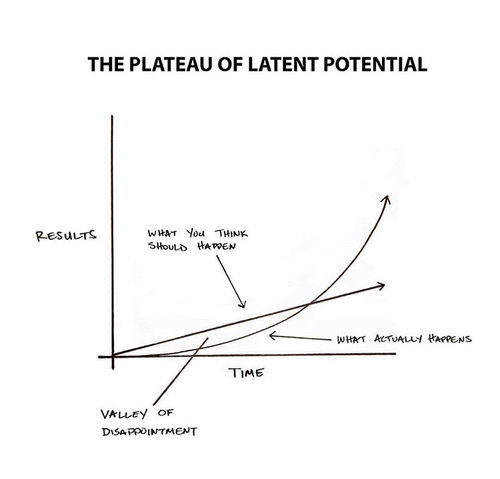
"Work isn't wasted, it's stored."
"Your habits are how you embody your identity" (36).
"The most practical way to change who you are is to change what you do" (38).
"Each habit not only gets results but also teaches you something far more important: to trust yourself" (38).
"New identities require new evidence...Once you decide the type of person you want to be be (39)
"Every action is a vote for the kind of person you want to be."
"Before we can effectively build new habits, we need to get a handle on our current ones. This can be more challenging than it sounds because once a habit is firmly rooted in your life, it is mostly non-conscious and automatic. If a habit remains mindless, you can't expect to improve it. As the psychologist Carl Jung says, 'Until you make the unconscious conscious, it will direct your life and you will call it fate'" (62).
"Environment is the invisible hand that shapes human behavior" (82).
"Making a better decision is easy and natural when the cues for good habits are right in front of you... Environmental design is powerful... Be the designer of your world and not merely the consumer of it" (87, emphasis mine).
"...whatever habits are normal in your culture are among the most attractive behaviors you'll find" (114).
"... there are many different ways to address the same underlying motive. One person might learn to reduce stress by smoking a cigarette. Another person learns to ease their anxiety by going for a run. Your current habits are not necessarily the best way to solve the problems you face; they are just the methods you learned to use. Once you associate a solution with the problem you need to solve, you keep coming back to it" (128).
"Even the tiniest action is tinged with the motivation to feel differently than you do in the moment. When you binge-eat or light up or browse social media, what you really want is not a potato chip or a cigarette or a bunch of likes. What you really want is to feel different" (130).
"Habit formation is the process by which a behavior becomes progressively more automatic through repetition. The more you repeat an activity, the more the structure of you brain changes to become efficient at that activity...First described by neuropsychologist Donald Hebb in 1949, this phenomenon is commonly known as Hebb's Law: 'Neurons that fire together wire together'" (143).
"The most effective form of learning is practice, not planning" (147).
"Out of all the possible actions we could take, the one that is realized is the one that delivers the most value for the least effort. We are motivated to do what is easy" (151).
"Habits like scrolling our phones, checking email, and watching television steal so much of our time because they can be performed almost without effort. They are remarkably convenient.
"In a sense, every habit is just an obstacle to getting what you really want. Dieting is an obstacle to getting fit. Meditation is an obstacle to feeling calm. Journaling is an obstacle to thinking clearly. You don't actually want the habit itself. What you really want is the outcome the habit delivers" (152).
"The idea behind make it easy is not to do only easy things. The idea is to make it as easy as possible in the moment to do things that payoff in the long run" (153).
"You can also invert this principle and prime the environment to make bad behaviors difficult" (157).
Goodhart's Law: "When a measure becomes a target, it ceases to be a good measure" (203).
Quote back from chapter 1: "If you're having trouble changing your habits, the problem isn't you. The problem is your system. Bad habits repeat themselves again and again not because you don't want to change, but because you have the wrong system for change" (252).
No comments:
Post a Comment